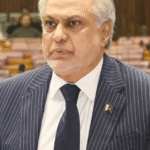In a significant legal and political development, the Anti-Terrorism Court (ATC) in Islamabad has issued non-bailable arrest warrants for Khyber Pakhtunkhwa Chief Minister Ali Amin Gandapur and three other prominent politicians. This action is tied to serious charges related to vandalism at the Judicial Complex in Islamabad. The issuance of these warrants not only raises questions about the legal repercussions for the involved politicians but also sheds light on the broader political dynamics surrounding the Pakistan Tehreek-e-Insaf (PTI) party and its ongoing challenges in the current political climate.
The Context of the Case
On September 21, 2024, the ATC issued non-bailable arrest warrants for Ali Amin Gandapur, former Deputy Speaker of the Punjab Assembly Wasiq Qayyum Abbasi, Istehkam-e-Pakistan leader Aamer Mehmood Kiani, and PTI leader Raja Rashid Hafeez. The court also declared ex-PTI leader Umer Tanveer Butt an absconder due to his continuous absence from the proceedings.
The warrants stem from a case that has been making headlines since March 18, 2023, when violent protests erupted at the Federal Judicial Complex. These protests coincided with the court appearances of PTI founder Imran Khan, leading to chaos and injuries among law enforcement personnel. The vandalism and attacks on police vehicles during these protests prompted authorities to file charges against various PTI leaders, framing the incident within the context of terrorism-related offenses.
Background of the Judicial Complex Incident
The incident at the Judicial Complex involved PTI supporters who clashed with law enforcement while protesting against the legal troubles faced by their leader, Imran Khan. During the protests, which violated Section 144—an order prohibiting gatherings—the situation escalated dramatically. Police reported that 52 officers were injured, and multiple vehicles were damaged or set ablaze.
The aftermath of this unrest was the initiation of a terrorism case by the counter-terrorism department, aimed at holding responsible those who incited violence and vandalism. The legal ramifications of this incident have now culminated in the recent court actions, including the issuance of non-bailable arrest warrants.
Legal Proceedings and Court Decisions
During the recent court hearing, Judge Tahir Abbas Sipra rejected a bail petition filed by Gandapur, stating that relief could not be granted without substantial justification. The defense argued that Gandapur was unable to appear in court due to blocked routes, but the judge noted that this was not a valid reason for repeated absences. As a result, the court has set the next hearing for October 3.
Protective Bail from the Peshawar High Court
In a parallel legal maneuver, the Peshawar High Court (PHC) granted Ali Amin Gandapur protective bail, prohibiting his arrest until October 5. This decision was made shortly after the ATC’s issuance of the arrest warrant, demonstrating the complexities of navigating the legal system for politicians accused of serious crimes.
The PHC acknowledged Gandapur’s concerns regarding politically motivated charges and his right to know about the cases against him. This decision emphasizes the challenges that public representatives face, particularly in a politically charged atmosphere where accusations can be seen as tools for political persecution.
Political Implications of the Arrest Warrants
The issuance of non-bailable warrants against prominent PTI leaders has broader implications for the party and its supporters. As PTI prepares for a rally in Lahore, scheduled to take place under strict conditions imposed by local authorities, the arrest warrants add an element of tension and uncertainty to their plans.
PTI’s Current Political Climate
The political landscape in Pakistan is increasingly polarized, with PTI facing significant opposition from the ruling coalition. The government’s actions against PTI leaders can be interpreted as an attempt to stifle dissent and curb the party’s influence in the lead-up to critical elections. The arrest warrants, therefore, are not just legal documents; they are a manifestation of the ongoing struggle for power and influence in Pakistan’s turbulent political arena.
The Role of Social Media and Public Perception
In the age of social media, the rapid dissemination of information can amplify political events and shape public opinion. The PTI’s supporters are highly active online, using platforms to rally support and express dissent against the government’s actions. The arrest warrants against Gandapur and other leaders have prompted widespread discussions on social media, with supporters framing the legal actions as politically motivated.
Impact on Public Sentiment
The perception of political persecution resonates deeply with PTI supporters, many of whom view these actions as part of a broader strategy to marginalize their party. This sentiment can bolster the party’s narrative of victimization, potentially galvanizing support ahead of the Lahore rally and other political events. The dynamic interplay between legal actions and public perception is crucial in shaping the future trajectory of PTI.
The Judicial Complex Incident and Its Aftermath
The events surrounding the Judicial Complex have had lasting repercussions for PTI and its leadership. The protests not only resulted in legal consequences for the involved politicians but also raised questions about the party’s ability to manage its supporters and maintain order during politically charged events.
Analyzing the Protests
The protests at the Judicial Complex are emblematic of the larger tensions within Pakistan’s political framework. They underscore the challenges that political parties face in maintaining control over their supporters while navigating a contentious legal and political landscape. The situation also highlights the delicate balance between activism and legality, as PTI seeks to rally support without crossing legal boundaries.
The Future for Ali Amin Gandapur and PTI
As the situation unfolds, the future for Ali Amin Gandapur and PTI remains uncertain. The upcoming court dates will be crucial in determining the course of legal proceedings and the potential impact on the party’s political fortunes.
Legal Strategy Moving Forward
Gandapur’s legal team will likely continue to seek protective measures and challenge the validity of the charges against him. The juxtaposition of protective bail from the PHC and the arrest warrant from the ATC illustrates the complexities of navigating the legal system in a politically charged environment.
Political Mobilization
In parallel, PTI is expected to leverage the situation to mobilize its supporters, framing the legal challenges as evidence of political persecution. The upcoming rally in Lahore will serve as a critical platform for PTI to rally support and assert its narrative of resistance against government oppression.
Conclusion
The issuance of non-bailable arrest warrants for Khyber Pakhtunkhwa Chief Minister Ali Amin Gandapur and other PTI leaders represents a significant moment in Pakistan’s evolving political landscape. As the legal battles unfold, the ramifications extend beyond the courtroom, influencing public sentiment, party dynamics, and the broader political narrative in the country.
The situation serves as a reminder of the intricate interplay between law and politics in Pakistan, where legal actions are often intertwined with political motivations. As PTI navigates these challenges, the upcoming weeks will be critical in shaping the party’s future and its ability to maintain its foothold in the volatile political arena.
#AliAminGandapur #PTI #PoliticalArrests #Islamabad #JudicialComplex #PakistanPolitics #TerrorismCharges #PublicSentiment #LegalBattles #PoliticalPersecution







